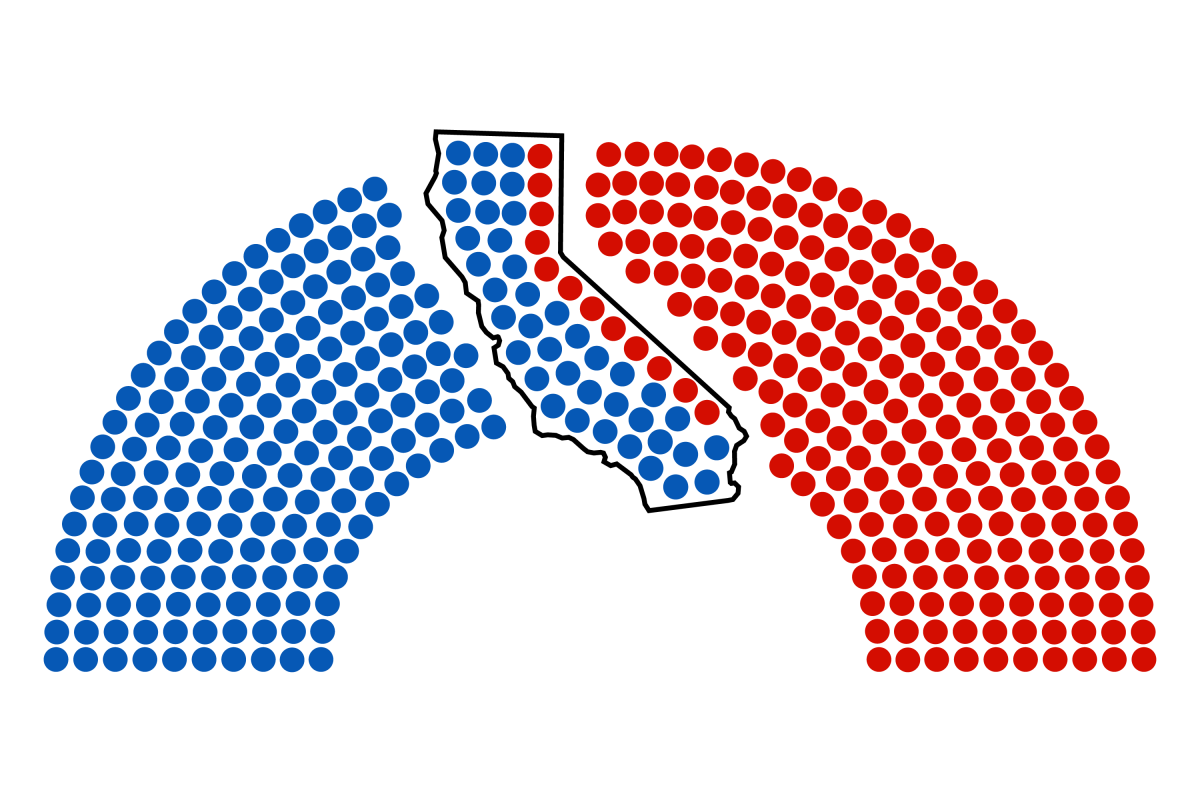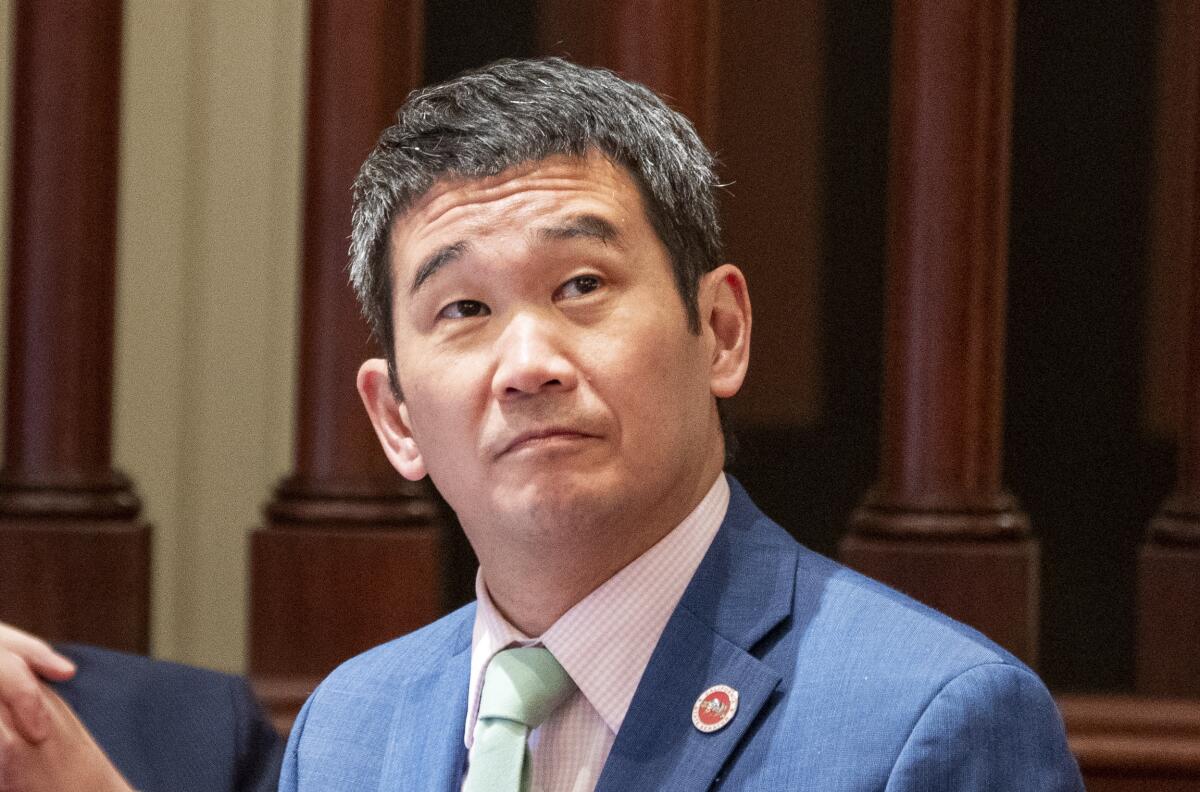‘Path to 218 runs through California’: State races pivotal in fight to control the House

- Share via
Barring divine intervention or the West Coast falling into the sea, President Biden will handily win California in the November election.
But should he — or presumptive GOP nominee Donald Trump — secure a second term in the fall, the future of either’s policy agenda rests heavily on which party controls Congress, where Republicans currently hold a wafer-thin majority in the U.S. House of Representatives.
With the Golden State home to some of the most hotly contested swing districts in the country, the House’s fate will almost certainly come down to California.
The battle for the next two years of partisan political control will be waged door-to-door, from California’s beachside suburban cul-de-sacs to the tiny farm towns in the state’s fertile Central Valley.
Those battlefields will look a lot like Bridgecreek Plaza — a sun-bleached shopping center a few hundred yards from a freeway onramp in Orange County’s Huntington Beach. The mall is home to a crystal store, several insurance brokers, a dentist and the local Republican Party headquarters.
It’s also where about two dozen GOP faithful gathered on the morning of election day, bowing their heads for a quick prayer and pledging allegiance to a portable flag before turning their attention to Jessica Millan Patterson, chair of the California Republican Party.
Patterson was in a very good mood.
When she was first elected to lead the party, in 2019, California Republicans were “essentially the third-largest party in the state,” having sunk below the share of voters registering “decline to state” under party preference.
But Patterson had presided over a massive voter registration drive over the last five years, and the party had moved back into second. People across the country liked to dismiss “blue California,” she said, but they were forgetting that California has more registered Republicans than any other state.
“California Republicans are the reasons why we have a House majority,” she added, to raucous cheering.
That majority was what they hoped to hold on to, and the group would spend the morning of the March 5 primary election canvassing for Scott Baugh, a Republican attorney and former state Assembly member vying to push Democratic Rep. Katie Porter’s soon-to-be-open congressional seat back from blue to red.

The latest round of redistricting put more conservative enclaves such as Huntington Beach and Newport Beach into California’s 47th Congressional District, and Baugh lost to Porter only narrowly in 2022 despite being vastly outspent, making the coastal Orange County district one of the most competitive in the nation.
The charismatic Porter will be out of the House picture after a failed Senate run; her seat is one of the National Republican Congressional Committee’s three offensive targets in California and top priorities. And it’s equally prized by Democrats.
Trump’s shadow over the 2024 election will remain through November, and only increase Adam Schiff ‘s chances of becoming California’s newest U.S. senator.
In a country where enmity and distrust separate the two major political parties on most issues, California’s utmost importance to any November House strategy is one of the few things on which Republicans and Democrats can agree.
California is home to 10 races rated as competitive by the nonpartisan Cook Political Report — five of them in districts that are represented by Republicans but that President Biden won in 2020. In the months to come, both parties will be investing significant resources in those races, as national attention inevitably turns west.
With an expected Biden-Trump rematch, voter turnout in 2024 is also likely to be supercharged compared with the 2022 midterm election. That could give an edge to Democrats, given the registration advantage that they hold in many of the competitive districts. Republicans gained one California House seat in the 2022 midterms, a nonpresidential election when turnout was substantially lower than when Biden and Trump topped the ballot two years prior.
“At the end of the day, the path to 218 runs through California,” said Democratic Congressional Campaign Committee spokesperson Dan Gottlieb, referring to the number of seats needed to garner a House majority.

Gottlieb was bullish on his party’s chances, citing the high turnout expected for the presidential election, along with strong Democratic candidates and “a bunch of dysfunctional and out-of-touch Republicans enabling the worst of their party’s chaos and dysfunction and extremism.”
But Gottlieb’s GOP counterpart was equally roseate in his outlook, with National Republican Congressional Committee spokesperson Ben Petersen reveling in the ugly and expensive primary fights that consumed Democrats in several of the state’s most crucial swing districts.
In the O.C. district where GOP volunteers fanned out for Baugh on primary morning, Democrats had sunk millions into a bruising primary battle between state Sen. Dave Min and fellow Democrat Joanna Weiss. Min ultimately emerged victorious, but only after surviving a barrage of negative advertising centered on his 2023 arrest for driving while intoxicated — arguably a gift to Republicans ahead of his fall battle with Baugh.
Stakes are high in California’s 47th Congressional District race, with Democrats Dave Min and Joanna Weiss and Republican Scott Baugh among top contenders for the seat.
“Extreme Democrats are stumbling out of their vicious primary fights broke and bested by Republicans, who saw a groundswell of support for a commonsense safety and affordability agenda,” Petersen said, adding that the primary results made clear the GOP was “playing offense in California” in a way that would set the stage for victories in November.
Baugh, though, is not expected to go unscathed. In 2022, Porter’s ad campaign ripped the Republican for his antiabortion stance, as well as his work as a lobbyist and criminal charges he faced over campaign violations, for which he ultimately paid $47,000 in fines.
In the San Joaquin Valley, there were last-minute fears that a bruising primary battle would lock Democrats out of one of the races where they have the best chance of flipping a seat, but those concerns proved overblown.
Rudy Salas, backed by the Democratic establishment, vanquished fellow Democrat Melissa Hurtado to secure a spot in the fall against incumbent Rep. David Valadao (R-Hanford) in the 22nd Congressional District, but that race also put a dent in Democratic coffers.
The November race will be a rematch of the pair’s 2022 runoff, when Salas lost to Valadao by several thousand votes. And Salas and Valadao won’t be the only rematch on the November ticket.
In a heavily agricultural San Joaquin Valley district that includes all of Merced County and parts of Fresno, Madera, San Joaquin and Stanislaus counties, incumbent GOP Rep. John Duarte will once again face off against Democratic challenger Adam Gray. Duarte won the 13th Congressional District in the midterm election by fewer than 600 votes, one of the closest races in the nation.
Several hundred miles southeast, in Southern California, Democratic challenger Will Rollins will again take on GOP incumbent Rep. Ken Calvert, the longest-serving member of the California delegation. The recently redrawn 41st Congressional District stretches from the suburban Inland Empire, where Calvert has long lived, to Palm Springs, where Rollins and his partner make their home.
The rematch between Republican Rep. Ken Calvert and Democrat Will Rollins is one of several 2024 California races that will help determine which party controls the House.
The district’s new boundaries — which now include one of the largest concentrations of LGBTQ+ voters in the nation and liberal pockets of Californians in the desert — are far more friendly to Democrats. They also set up Rollins, who is gay, as a potent challenger to Calvert, who voted against LGBTQ+ rights in the past, but who says his views have since evolved.
One race that will have some new blood this year, after the same pair of candidates dueled in three previous elections, is California’s 27th Congressional District in northern Los Angeles County.
Once solidly Republican, the district has been reconfigured by redistricting, and has undergone a political transition driven by younger, more diverse transplants from L.A. seeking affordable housing in Santa Clarita and the Antelope Valley. The district briefly switched from red to blue with former Rep. Katie Hill’s victory in 2018, but the young Democrat’s very public scandals and ultimate resignation helped hand the seat back to the GOP.
Now-incumbent GOP Rep. Mike Garcia beat Democrat Christy Smith in a 2019 special election to fill the seat, then twice more for full terms in 2020 and 2022. He will face off against George Whitesides, a fresh Democratic challenger, in November.
Ludovic Blain, executive director of the California Donor Table, a progressive group that pools donor funds, said his organization hopes to invest about $10 million in California House races in the fall, working with local nonprofits in key areas to turn out voters of color.
They’ll be focusing on seven key races: the three aforementioned rematches, Porter’s open seat and two other Orange County races, and the Garcia-Whitesides matchup.
One point of concern Blain raised is that Republican Steve Garvey’s place near the top of the ticket, facing off against Rep. Adam B. Schiff (D-Burbank) in the Senate race, might affect Democrats in House races.
Schiff engaged in a controversial strategy in the primary, boosting Garvey to lock out Porter and his other major Democratic challenger, Rep. Barbara Lee (D-Oakland), whom Blain’s organization supported.
It was a gambit that some in the Democratic establishment said would actually help Democrats in other tight races, since a less-competitive Senate race would siphon away far less money from the party’s coffers.
Two of Garvey’s children say he has declined to meet with them, while his eldest daughter says he cut her and her children off without explanation.
But others, like Blain, argue that Garvey’s presence could hurt down-ballot Democrats. Plus, having him on the ballot may draw in moderate Republican and independent voters who remain sour on Trump.
“Having Garvey, I think, does spike or further encourage Republican voters to turn out, and more importantly, to vote down the ticket,” Blain said.
Patterson agreed. Unlike Trump, Garvey will likely campaign across the state, providing a lift for other Republicans while he’s at it.
More to Read
Sign up for Essential California
The most important California stories and recommendations in your inbox every morning.
You may occasionally receive promotional content from the Los Angeles Times.















